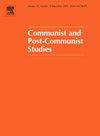Orthodox Conservatism and the Refugee Crisis in Bulgaria and Moldova
IF 1.3
4区 社会学
Q3 INTERNATIONAL RELATIONS
引用次数: 3
Abstract
In 2015, the Bulgarian Orthodox Church issued an unusual statement declaring that the arrival of refugees represented a “true invasion” in the region. One year later, during debates on Moldova’s presidential elections, the Orthodox Church endorsed the fake news that 30,000 Syrians were about to arrive in the country. Drawing on interviews in Chişinău and Sofia, the article argues that the European refugee crisis has led to an internationally-linked Orthodox conservatism characterized by five components: defending a mythical past; fostering close relations with state authorities; anti-Westernism; building conservative networks at local, national, and geopolitical levels; and presenting Orthodox churches as alternative governance structures. These components shape religion–state relations in predominantly Orthodox countries in the region and have had a direct impact on the ways in which religious and state bodies have responded to populism and geopolitics.东正教保守主义与保加利亚和摩尔多瓦的难民危机
2015年,保加利亚东正教发表了一份不同寻常的声明,宣称难民的到来代表着对该地区的“真正入侵”。一年后,在关于摩尔多瓦总统选举的辩论中,东正教支持了3万叙利亚人即将抵达该国的假新闻。这篇文章引用了在Chişinău和Sofia的采访,认为欧洲难民危机导致了一种国际联系的正统保守主义,其特征有五个:捍卫神话般的过去;促进与国家当局的密切关系;反西方主义;在地方、国家和地缘政治层面建立保守的网络;以及将东正教作为替代治理结构。这些组成部分塑造了该地区以东正教为主的国家的宗教-国家关系,并对宗教和国家机构应对民粹主义和地缘政治的方式产生了直接影响。
本文章由计算机程序翻译,如有差异,请以英文原文为准。
求助全文
约1分钟内获得全文
求助全文
来源期刊

Communist and Post-Communist Studies
Multiple-
CiteScore
1.90
自引率
0.00%
发文量
23
期刊介绍:
Communist and Post-Communist Studies is an international journal covering all communist and post-communist states and communist movements, including both their domestic policies and their international relations. It is focused on the analysis of historical as well as current developments in the communist and post-communist world, including ideology, economy and society. It also aims to provide comparative foci on a given subject by inviting comments of a comparative character from scholars specializing in the same subject matter but in different countries.
 求助内容:
求助内容: 应助结果提醒方式:
应助结果提醒方式:


